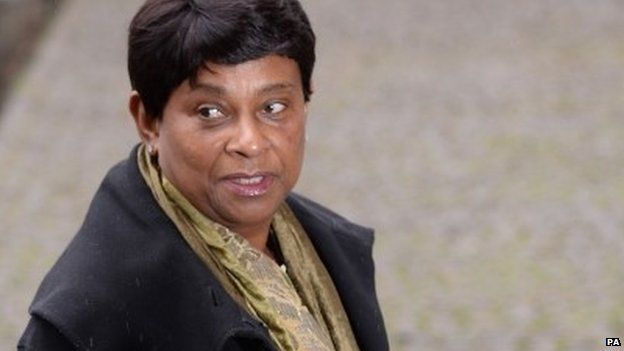Mother of murdered Stephen Lawrence 'most powerful woman'
- Published

The mother of murdered teenager Stephen Lawrence has been named the most powerful woman in the country in a list drawn up for BBC Woman's Hour.
Baroness Doreen Lawrence headed the 10 women 'game-changers', which included activists and chief executives.
Home Secretary Theresa May, who appeared on the 2013 Woman's Hour Power List, branded her "an example" to all.
But Baroness Lawrence said she would give up all her achievements to have an ordinary life with family around her.
"I know I have worked extremely hard over the years to bring to the attention of the authorities what happened to my son," she said.
"But I would give all of those things up just to have an ordinary family life and to have my family around me. So it's fantastic that this is it, but I would rather not."
Baroness Lawrence's son Stephen was stabbed to death in an unprovoked racist attack in 1993.
He was 18 when he was attacked by a group of up to six white youths as he waited at a bus stop in Eltham, south east London on April 22.
It took more than 18 years to bring two of his killers to justice - in a fight largely fought by Baroness Lawrence.
'Game-changer'
The list of game-changers was compiled by a judging panel appointed by Woman's Hour.
The home secretary, who came second in the inaugural list last year, said Baroness Lawrence had been faced by a "terrible tragedy", yet picked herself up and carried on fighting to ensure that justice could be done.
"What is most striking about this woman is the great strength that she has shown over decades - strength to carry on, to keep on going, even in the most difficult times when all seemed impossible," Mrs May said.
"Also striking is the persistence that she has shown, because she has never given up. And finally, what is most impressive about this game-changer is that throughout it all, over the years, despite blow after blow, she has dealt with everything with absolute dignity."
The power list of 10 included women involved in issues such as child poverty, female genital mutilation (FGM) and internet safety.
The women, described as "game-changers", were revealed in a special live broadcast of Woman's Hour.
Accepting the honour, an emotional Baroness Lawrence said her fight for justice was not over. She urged young people to have the confidence to challenge racism and called for the Metropolitan Police to "hold up their hands" and admit their wrongdoings.
A public inquiry was launched last month following revelations that an undercover police officer spied on the Lawrence family during an investigation into Stephen's death.
'Keep fighting'
An earlier probe by Sir William Macpherson had identified "institutional racism" within the Met. The Macpherson report found a collective failure to provide appropriate and professional service to people because of the colour of their skin.
Baroness Lawrence told Woman's Hour: "I'm satisfied in a way that at last I can say there are two people serving a sentence for his murder.
"But I think what I would like to see, even during the trial we found those individuals were still sticking two fingers up at the authorities, they thought no way would they have gone to prison.
"Even the others who were there, they are living their lives and getting on having families. That has been denied me and my children have been denied having an older brother.
"So to say that I'm satisfied with justice, partly. Because I think it is only partly done that I am. And I shouldn't have to keep fighting, I really shouldn't have to."
Journalist Emma Barnett, who chaired the judging panel, said it was "no easy feat" to come up with 10 women who "changed the game".
"The ambition for this year's list was to capture a snapshot of a moment in time - of those particular 'games' in 2014 that need changing and the women making a real difference in those fields," Ms Barnett said.
"FGM is now taken seriously by politicians, while internet safety and child poverty are among the biggest problems society faces, and we have highlighted the women leading the charge to make sustainable changes in these areas and seven others."
The rest of the judging panel comprised barrister and former council leader Heather Rabbatts, writer Reni Eddo-Lodge, journalist Rachel Johnson and campaigner Liz Bingham.
Here is the top-10 list they compiled:
- Doreen Lawrence OBE - anti-racism campaigner
- Julie Bailey CBE - campaigner and founder of Cure the NHS
- Professor Nazneen Rahman - geneticist and cancer specialist
- Carmel McConnell - activist and founder of Magic Breakfast
- Julie Bentley - chief executive of Girlguiding
- Nimco Ali and Leyla Hussein - anti-FGM activists
- Dido Harding - CEO, TalkTalk Group
- Francesca Martinez - comedian, actress and disability campaigner
- Laura Bates - founder of the Everyday Sexism Project
- Caitlin Moran - journalist and author
- Published9 April 2014
- Published7 March 2014